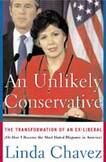From Left to Right?
Feeling totally alone and undone by a lack of support within the Bush administration, and just one week after Bush had nominated her as Secretary of Labor, Linda Chavez withdrew. Chavez explained that her opponents, especially the A.F.L.-C.I.O., the Democrats and their various interest groups had gone on a search and destroy mission to derail her nomination because of her conservative political views. In An Unlikely Conservative, Chavez wraps this story of her failed run for a cabinet post around the story of her life.
Like her brief moment in the Bush spotlight, Chavez’s autobiographic tale reveals much about her political ambitions. Beginning with the moment she learned of her possible nomination on Dec. 19, 2000, Chavez consciously withheld information about the illegal immigrant woman who had lived in the Chavez home for two years in the early 90’s. From the first question about anything that might embarrass the president, through two separate meetings with Bush, a specific question about nanny problems from staffers and two F.B.I. interviews, Chavez’s main concern was: If I tell them about Marta [the immigrant woman in question], they’re not likely to pick me. If I don’t tell them, they’re likely to find out anyway. Over and over again, she did not tell the Bush people, they did find out, and Chavez’s nomination bit the dust.
The press called her defiant and impenitent and, with the exception of Cal Thomas, attacked Chavez’s deceptions rather than her politics. Even Ellen Goodman, who regretted the Baird-ing of Chavez, thought the situation more complex than Chavez ever admitted.
The reader expects Chavez to offer an explication of her conservative views. Instead, she merely asserts her opposition to multiculturalism, bilingual education, affirmative action, the feminist agenda and unions. She offers no intellectual basis for her conservative ideas and substitutes name-dropping for alternative approaches to the many issues facing American society today.
Chavez never really was a liberal. She eschews any ambitions to be a professional ethnic, yet she has been an ambitious and opportunistic politico when being Hispanic has enhanced her career opportunities. Although she resented her middle-class Catholic high school in Denver, which tracked her into the academic courses (because she would rather have been in the cooking classes with her friends), she pursued her education to the doctoral level. As a Hispanic graduate student at U.C.L.A. in the 1970’s, she taught a Chicano literature course, but claims the students were unprepared and treated her badly; moreover, the Ford Foundation did not award her a fellowship, all because she was not Hispanic enough (read: Spanish-speaking and needy). From these experiences she concludes that affirmative action is misguided. Chavez seldom sees the contradictions in her own stories. She knew the nature of the fellowship and would have accepted it if offered, and never once does it seem to occur to her that the disruptive classrooms may have arisen out of her own naïveté as an instructor.
Following her husband to Washington, she laments landing jobs because employers strove to create ethnically balanced staffs. Chavez wanted to be valued for more than just her ethnic origins, yet she admits she did not initially possess the qualifications for her jobs, she never turned one down, and each position carried her up one more rung on her career ladder. One job was a stepping stone and another a real opportunity to get my foot in the door on Capitol Hill. After several such opportunities with the National Education Association, the American Federation of Teachers and the department of Health Education and Welfare, she lobbied to be staff director for the Civil Rights Commission, a powerful position from which she could launch her campaign against affirmative action. An ensuing White House appointment as public liaison made her little more than a high status hostess, so she quit to run for a Maryland Senate seat where she could affect public policy directly. She lost and, in a style now familiar, blamed the press, not her own political mistakes and mudslinging campaign.
Up to that point Chavez had gained considerable coinage with Washington conservatives. Representing U.S. English, a group promoting a constitutional amendment to make English the official language of the country, sealed her fate, she believes, as the most hated Hispanic in America. U.S. English served as a front for its founder’s ideas about race, eugenics and forced sterilization, however; and while Chavez describes her surprise when she perceived visceral hatred on the faces of many in her audiences, she never acknowledges that her detractors’ reactions could have arisen from their abhorrence of such practices rather than merely from her support of English as an official language, her conservative views or her seemingly anti-Hispanic stance.
Raul Yzaguirre, president of the National Council of La Raza and Chavez’s former boss, acknowledges that she has made a career out of being different (a kinder judgment than that of Frank del Olmo of The Los Angeles Times, who deems her a member of the so-called chattering class who writes...out of a series of right-leaning ivory towers inside the Beltway and a professional anti-Latino).
An Unlikely Conservative would have been a more interesting book if Linda Chavez understood she has been a conservative all along, accepted that she would have critics and took more time to explain the intellectual basis of her thought and the thought of other conservatives. Linda Chavez, after all she has written here, lost her best chance to shape a conservative public policy from a cabinet position, not because she is a conservative (John Ashcroft, after all, made it through his Senate confirmation), but because her ambition led her to that fatal sin of omission. No one even had the chance to challenge her conservative credentials.
This article also appeared in print, under the headline “From Left to Right?,” in the November 11, 2002, issue.








